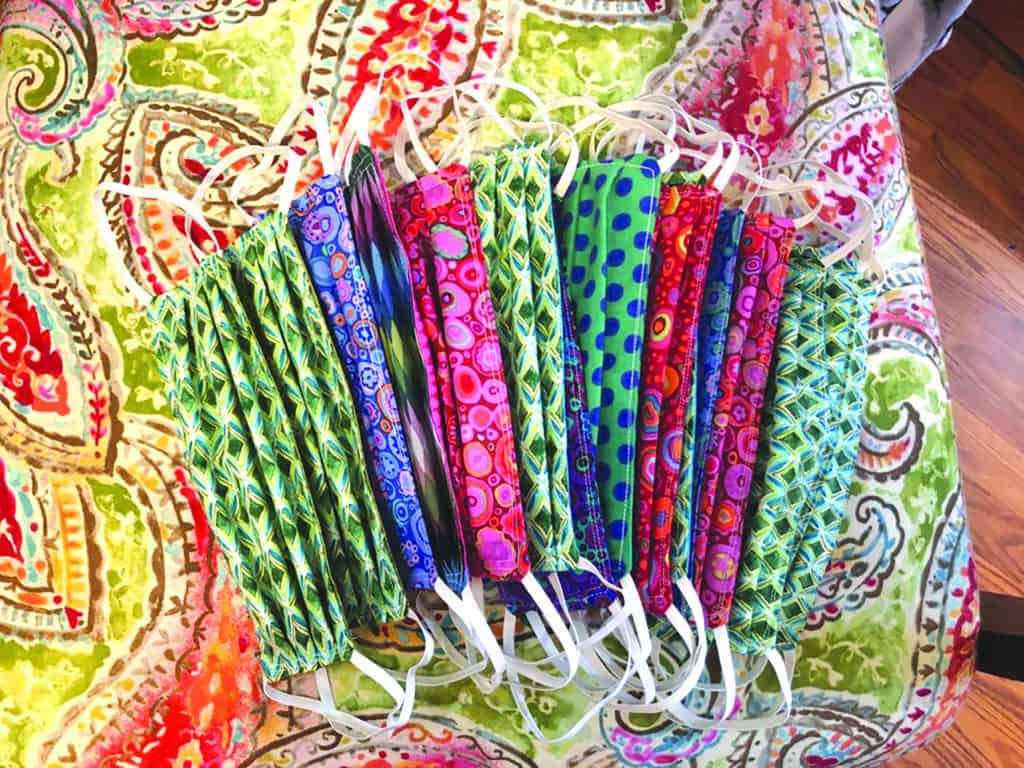
By Anne Galloway/VTDigger and Polly Mikula
As the nation, and the region, faces a dearth of personal protective equipment for health care providers in the wake of the COVID-19 outbreak, volunteers and small local companies are stepping up to fill the void.
Jillian Bradley, co-owner of the Barnard General Store, posted the following message to the Barnard Listserv on Sunday, March 22:
“I’ve seen several emails on the list about sewing masks for the hospitals. I have created a box for dropping off and picking up fabric and elastic. It is located at our round table. Anyone who has extra supplies, please put them in the box. Anyone who is sewing masks, feel free to come pick up the supplies that have been dropped off. If need be, I’m happy to deliver these materials to those sewing masks.”
Marnie DeFreest, the finance manager for VTDigger, also dragged her sewing machine out of the closet and got to work on her kitchen table this past Saturday morning, whipping up a colorful array of cotton masks for front-line workers at Dartmouth-Hitchcock Medical Center.
DeFreest and other local sewers are using instructions based on Centers for Disease Control and Prevention guidelines.
“I am doing it specifically for relatives and friends who are nurses who are being told their only option is to come to work wearing a bandanna,” DeFreest said.
The CDC has said patients, pharmacists, dentists and providers who are treating patients who don’t have the virus can use homemade masks, bandannas or scarfs to protect themselves and patients from spreading COVID-19. Cloth face coverings, however, are not enough protection for front-line workers who are taking care of people who test positive for the virus.
All DeFreest needs to keep going is more elastic for the ear loops. She made 18 before she ran out of the stretchy stuff, and anticipated making 38 over the weekend.
It turns out access to ¼-inch elastic is more elusive than she anticipated. There appears to have been a run on the material, according to several sewers interviewed for this article. Walmart and Joann Fabric were both sold out in Barre and Rutland, she said.
She put a call out on Facebook, and her husband and she, in a drug-deal like encounter inspired by social isolation in the era of COVID-19, picked up a bag of elastic dropped off at a gas station.
DeFreest is part of a group of 490 Dartmouth-Hitchcock volunteers who are sewing masks for hospital staff and patients. Two companies, Fat Hat Clothing in Quechee and Vermont Glove in Randolph, have also offered to manufacture masks for health care workers in the region.
The hospital is preparing kits with fabric and elastic for local pickup and launched a website with directions on how to sew the masks.
The cloth masks allow the hospital to redeploy medical masks for critical care nurses and doctors. Masks can be dropped off in resealable plastic bags to the Dartmouth-Hitchcock Service Center, Green Warehouse, 50 LaBombard Road North, Lebanon, New Hampshire. The hospital will sanitize the masks and distribute them to staff, patients and visitors.
Kristin Roth, director of volunteer services at Dartmouth-Hitchcock, said they have ordered a bulk supply of elastic that should be in early next week. In the meantime, the hospital has found other sources for the material and is offering kits for volunteers.
“It allows us to stretch our supplies,” Roth said. “We have a robust group of volunteers who want to help, and it helps people feel empowered at a time when they don’t feel in control of things.”
Vermont Glove, a goat skin glove factory in Randolph, has made prototypes of the masks and plans to begin manufacturing them this week, according to owner Sam Hooper.
Joan Ecker of Fat Hat Clothing, a family-run designer clothing company based in Quechee, is also working on a prototype that can be mass produced by a small group of sewers and cutters.
“It’s an interesting and frightening time,” Ecker said. “The fact that it’s like a war zone, and the government isn’t doing anything is surprising. This gives people something to do every day.”
Ecker said her small team of four can cut 50 masks at a time, and with two sewers, she estimates they can produce one mask every 15 minutes. She is also going to offer kits to local sewers who want to pitch in.
“We want to help people feel safer going into the hospital,” Ecker said.
Her company also plans to make medical gowns for health care workers.




